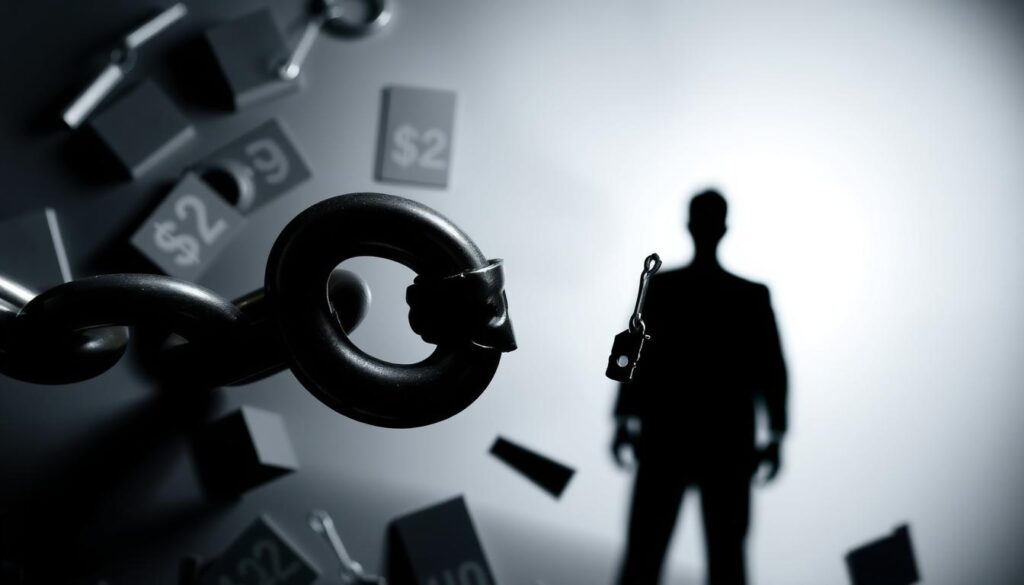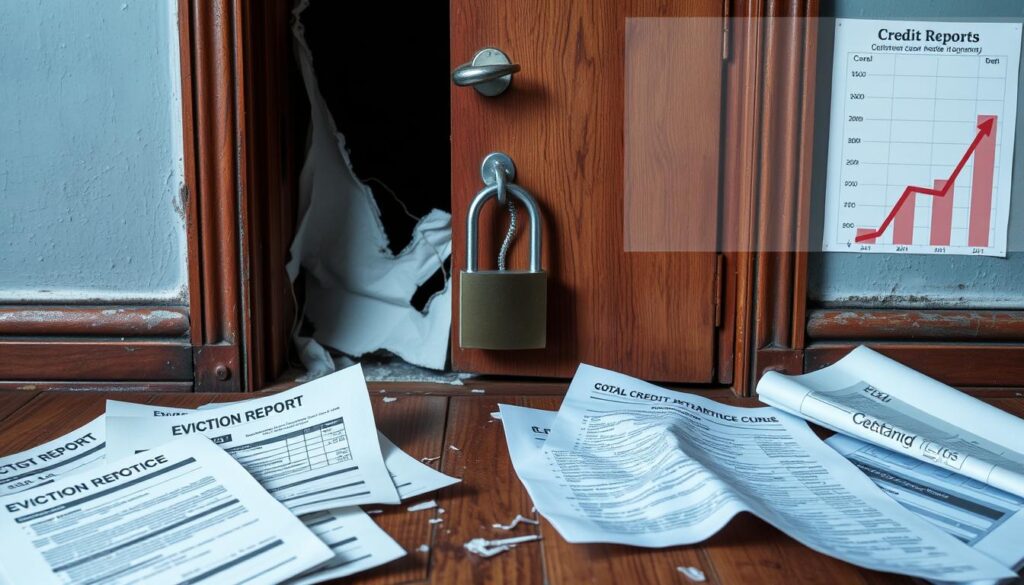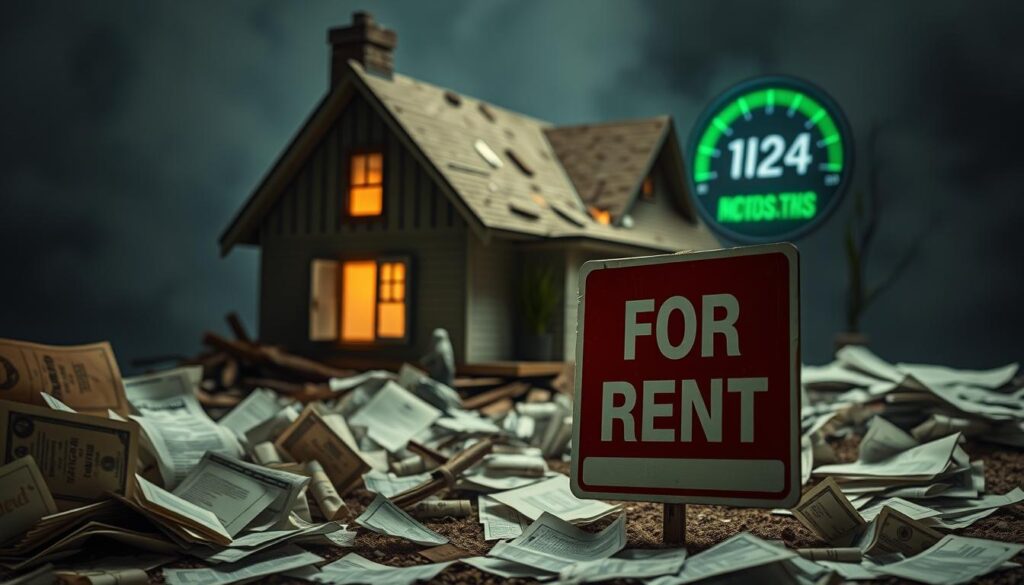An eviction on your credit report can severely impact your credit score. This drop can make it hard to get financing, a mortgage, or find a new rental. Let’s explore how an eviction affects your credit score.
We’ll look at factors that influence the score decline. We’ll also discuss strategies for credit recovery. Plus, we’ll cover ways to prevent an eviction from happening.
Key Takeaways
- An eviction can cause a significant drop in your credit score, typically ranging from 100 to 150 points.
- The severity of the credit score impact depends on factors like the length of the eviction process and the type of eviction.
- Rebuilding your credit after an eviction can be challenging, but there are steps you can take to improve your score over time.
- Effective communication with your landlord and understanding your rights can help prevent an eviction and protect your credit.
- The long-term effects of an eviction on your credit can extend beyond the initial score drop, making it crucial to address the issue proactively.
Understanding Credit Scores and Evictions
Your credit score shows how trustworthy you are with money. It’s key when applying for loans or setting interest rates. A good score is vital, especially when facing possible eviction.
What is a Credit Score?
A credit score is a number between 300 and 850. Higher scores mean you’re less likely to miss payments. Your score depends on your credit history, payment record, and credit use.
The Importance of a Good Credit Score
A score of 700 or above is considered good. It can lead to better loan terms and lower interest rates. Some jobs even look at credit scores when hiring.
A good score helps you get loans, credit cards, and mortgages. It’s also useful when renting an apartment. Low scores can mean higher interest rates or rejected applications.
“A good credit score is like a golden ticket – it can unlock a world of financial opportunities and make your life easier.”
Knowing how credit scores work is crucial. Understanding how events like eviction affect your score helps maintain financial stability. This knowledge is key to building a strong financial future.
The Impact of Eviction on Your Credit Rating
An eviction can severely damage your eviction credit rating. It affects your ability to rent, borrow money, or get a job. The effects of eviction on credit can last for years, hurting your financial health.
An eviction on your credit report can drop your score by 100 points or more. This makes it hard to get credit, rent a place, or even find work.
- Evictions stay on your credit report for up to 7 years, hurting your eviction credit rating.
- Landlords often check credit reports, and an eviction can stop you from renting.
- Lenders may see an eviction as a warning sign, making loans and credit cards harder to get.
The effects of eviction on credit can be wide-ranging and long-lasting. It’s important to understand these effects and take action to fix the damage.
By facing an eviction head-on and working to rebuild your credit, you can overcome this challenge. With effort, you can regain your financial footing.

Factors Affecting Credit Score Drop from Eviction
Evictions can impact your credit score differently. The severity depends on key factors. These include the length of the eviction process and the type of eviction.
Length of Eviction Process
The duration of eviction affects your credit score drop. Longer processes often cause more damage. This is because extended evictions suggest financial instability to lenders.
Type of Eviction
Different eviction types influence credit score impacts. Formal evictions involving court proceedings hurt scores more than informal agreements. They leave a lasting record on your credit report.
| Factor | Impact on Credit Score Drop |
|---|---|
| Length of Eviction Process | Longer process = More substantial drop |
| Type of Eviction | Formal eviction = More severe impact |
Knowing these factors helps predict eviction’s credit score effects. It allows you to take steps to reduce potential damage.
How Many Points Does An Eviction Drop Your Credit Score
An eviction can severely hurt your credit score. Experts say it may lower your score by 50 to 150 points. The impact varies based on several factors.
The credit score drop depends on key elements:
- Length of the eviction process – The longer it takes, the worse it is for your credit.
- Type of eviction – Court-filed evictions hurt more than informal “cash for keys” deals.
- Your credit history – A strong credit past may lessen the blow of an eviction.
An eviction often causes a big hit to your credit. It can lower your score by 100 points or more. Over time, you can rebuild your credit with good money habits.
| Scenario | Credit Score Drop |
|---|---|
| Formal Eviction | 100-150 points |
| Informal “Cash for Keys” Eviction | 50-100 points |
An eviction can greatly harm your eviction credit score penalty. Know the risks and take steps to protect your money future.

Credit Score Recovery After an Eviction
An eviction can hurt your credit score, but it’s not permanent. You can rebuild your credit with proactive steps. Taking action helps you recover from the credit score drop caused by eviction.
Steps to Rebuild Your Credit
Here are effective strategies to help you rebuild your credit score after an eviction:
- Request a copy of your credit report and identify any errors related to the eviction. Dispute these with the credit bureaus to have them removed.
- Pay all your bills on time, including any debts or collections related to the eviction. Timely payments are crucial for rebuilding your credit.
- Consider applying for a secured credit card, which requires a refundable security deposit. Use the card responsibly by keeping your utilization low and making on-time payments.
- Become an authorized user on someone else’s credit card with a long history of responsible usage. This can help boost your credit score.
- Explore credit-building programs or loans designed to help individuals with poor credit improve their scores over time.
You can recover your credit score after an eviction with patience and commitment. Responsible financial management is key to regaining stability.
“The road to credit score recovery after an eviction may be long, but it’s entirely achievable with the right approach.”
Eviction and Credit Score: Myths vs. Facts
Myths about eviction and credit scores can lead to poor decisions. Let’s separate fact from fiction. This knowledge will help you make better financial choices.
Myth: Eviction Automatically Destroys Your Credit Score
An eviction doesn’t always wreck your credit score. Its impact varies based on several factors. These include the eviction process length and your financial history.
Fact: Eviction Impact Depends on Credit History
Your existing credit history affects how an eviction impacts your score. A strong credit profile may soften the blow. However, a weaker credit history could lead to a bigger drop.
Myth: Eviction Stays on Your Credit Report Forever
Evictions can stay on your credit report for up to seven years. But they’re not permanent. With good financial habits, you can improve your credit score over time.
Fact: Proactive Steps Can Mitigate Eviction Damage
You can lessen an eviction’s impact on your credit score. Try negotiating with landlords or seeking legal help. Develop a credit rehabilitation plan to rebuild your financial standing.
Understanding these facts helps protect your financial health. You can make smarter choices and take the right actions. This knowledge empowers you to safeguard your credit score.
Credit Score Impact of Eviction: A Case Study
Jessica, a 32-year-old single mom, lost her job unexpectedly. She fell behind on rent, leading to eviction. This event left a lasting mark on her credit report.
Before eviction, Jessica’s credit score was 720. She had managed her finances responsibly. However, the eviction process severely affected her creditworthiness.
Jessica’s credit score plummeted by 85 points within 3 months. This drop occurred after the eviction was reported to credit bureaus.
| Credit Score Before Eviction | Credit Score After Eviction | Credit Score Drop |
|---|---|---|
| 720 | 635 | 85 |
The credit score drop had immediate consequences for Jessica. She struggled to find new housing. Landlords often check credit and view evictions negatively.
Jessica’s auto insurance rates increased. She also faced challenges getting loans or credit cards with good terms.
This case study shows the credit score impact of eviction. It reveals how much damage an eviction can cause. It’s a warning to protect your credit score and avoid evictions.
Preventing Evictions and Protecting Your Credit
Evictions can severely impact your credit score. It’s vital to focus on prevention strategies. Communicate with landlords and know your rights to protect your housing and credit.
Communication with Landlords
Open communication with your landlord is crucial to avoid eviction. If you’re struggling financially, reach out to them immediately. Many landlords will work with tenants to find solutions.
They might offer payment plans or help you seek rental assistance. Being proactive can make a big difference in keeping your home.
Understanding Your Rights
Knowing your renter rights can help prevent unfair evictions. Laws may protect you from unjust eviction procedures. Understanding these rights ensures your landlord follows proper protocols.
They must give appropriate notice if pursuing eviction. This knowledge empowers you to defend your housing situation effectively.
Taking action to prevent evictions and protect your credit safeguards your financial future. Communicating with landlords and understanding your renter rights helps maintain stable housing.

Eviction Credit Damage: Short-term vs. Long-term Effects
An eviction can harm your credit score both now and later. It’s vital to know how this impacts you right away and in the future. This knowledge helps you handle the credit damage from an eviction.
Right after an eviction, your credit score may drop by 100 to 150 points. This sudden decrease makes it hard to get loans, credit cards, or new rentals.
The long-term effects of an eviction on your credit, however, can be even more detrimental. Your credit report may show the eviction for up to 7 years. This ongoing mark keeps hurting your score and makes rebuilding credit tough.
| Short-term Effects | Long-term Effects |
|---|---|
| Immediate drop in credit score (100-150 points) | Eviction record remains on credit report for up to 7 years |
| Challenges securing loans, credit cards, and rental agreements | Ongoing difficulty in rebuilding credit over an extended period |
| Difficulty accessing new credit and housing options | Potential for higher interest rates and less favorable terms on future credit |
To lessen eviction’s impact on your credit, take action quickly. Talk to your landlord and learn your rights. Start rebuilding your credit as soon as you can.
By facing the issue head-on, you can reduce the damage. This approach helps you work towards a stronger financial future.
Eviction Credit Hit: What to Expect
An eviction on your credit report can have serious consequences. It affects more than just your credit score. The impact can be severe and touch many areas of your life.
Potential Consequences
Finding a new home becomes much harder. Landlords often check credit reports and may avoid tenants with eviction histories. This can greatly limit your housing options.
Job opportunities might suffer too. Some employers review credit reports during background checks. An eviction could raise red flags and hurt your chances of getting hired.
Getting loans becomes more challenging. Lenders may see an eviction as a sign of financial risk. They might reject your application or offer less favorable terms.
Even basic services can be affected. Banks may hesitate to open new accounts for you. Utility companies might ask for larger deposits or deny service altogether.
The effects of an eviction can last a long time. It’s important to understand how serious this is. Take steps to lessen its impact on your finances and future.

| Potential Consequence | Impact |
|---|---|
| Securing Future Housing | Landlords may be hesitant to rent to individuals with a history of evictions, limiting housing options. |
| Employment Opportunities | Employers may conduct background checks that include credit reports, potentially affecting job prospects. |
| Obtaining Loans | Lenders may view an eviction as a risk factor, making it more difficult to secure financing. |
| Access to Bank Accounts and Utilities | Utility providers and financial institutions may impose additional requirements or deny service due to the eviction. |
Recovering from Eviction Credit Drop: A Step-by-Step Guide
An eviction can severely impact your credit score. But don’t lose hope. You can bounce back with the right approach and determination. Let’s explore how to rebuild your credit and regain financial stability.
Here’s a step-by-step guide to help you recover:
- Understand the Impact: Evictions can harm your credit score for years. Knowing this helps you create a focused recovery plan.
- Dispute Inaccuracies: Check your credit report carefully. Challenge any wrong or incomplete info about the eviction. This can lessen the negative effect on your score.
- Prioritize Payments: Keep a clean payment history going forward. Pay all your bills on time to show responsible money management.
- Seek Credit-Building Opportunities: Try getting a secured credit card. Or become an authorized user on someone else’s account. These steps can help rebuild your credit.
- Patience and Persistence: Recovering takes time and effort. Stay committed to your plan. Be patient as you work to improve your score.
Remember, recovering from an eviction credit drop is a journey. With the right steps, you can overcome challenges and rebuild your finances.
| Step | Description | Timeline |
|---|---|---|
| Understand the Impact | Recognize the magnitude of the eviction’s impact on your credit score. | Immediate |
| Dispute Inaccuracies | Review your credit report and dispute any errors related to the eviction. | 1-3 months |
| Prioritize Payments | Maintain a clean payment history by making timely payments on all accounts. | Ongoing |
| Seek Credit-Building Opportunities | Apply for a secured credit card or become an authorized user to rebuild your credit. | 3-6 months |
| Patience and Persistence | Stay committed to your plan and be patient as you work to improve your credit score. | 1-2 years |
These steps will help you recover from the eviction credit damage. Stay focused, and you’ll regain your financial footing over time.
Credit Consequences of Eviction: Beyond the Numbers
An eviction on your credit report impacts more than just your credit score. It can have far-reaching effects on your financial stability and daily life.
The fallout from an eviction can trigger a series of challenges. These problems can affect your finances and overall well-being for years to come.
- Difficulty securing future housing, as landlords often perform credit checks and may be hesitant to rent to those with an eviction history
- Obstacles in obtaining essential services, such as utility connections or cell phone contracts, which may require a credit check
- Complications in finding employment, as some employers conduct background and credit checks as part of the hiring process
- Challenges in obtaining loans, credit cards, or even securing a mortgage, as the eviction credit damage can linger on credit reports for years
Evictions can take a heavy emotional toll. They often lead to increased stress and anxiety. This can result in a lasting sense of financial insecurity.
“The credit consequences of eviction go far beyond just a number on a credit report. It’s a domino effect that can impact every aspect of a person’s life, from finding a new home to securing a job. The financial and emotional stress can be overwhelming.”
Dealing with eviction’s credit impact requires a multi-step approach. This includes rebuilding credit, advocating for your rights, and seeking community support. Understanding these challenges helps navigate them more effectively.
With proper knowledge, you can work towards a more secure financial future. It’s possible to overcome the hurdles an eviction presents.
| Consequence | Impact |
|---|---|
| Difficulty Securing Housing | Landlords often perform credit checks and may be hesitant to rent to those with an eviction history. |
| Obstacles in Obtaining Essential Services | Utility connections, cell phone contracts, and other services may require a credit check. |
| Challenges in Finding Employment | Some employers conduct background and credit checks as part of the hiring process. |
| Difficulties in Obtaining Loans and Credit | The eviction credit damage can linger on credit reports for years, making it hard to secure loans, credit cards, or a mortgage. |
Conclusion
An eviction can significantly impact your credit score. The drop in points depends on various factors. However, this setback doesn’t have to define your financial future.
Taking proactive steps can help you navigate credit consequences. Communicate with landlords and understand your rights. Work diligently to rebuild your credit after an eviction.
With determination and strategy, you can recover from the eviction credit score penalty. It’s possible to regain financial stability over time.
Stay informed and persistent in your efforts. Use available resources to rebuild your credit. Take control of your finances and move forward confidently.

